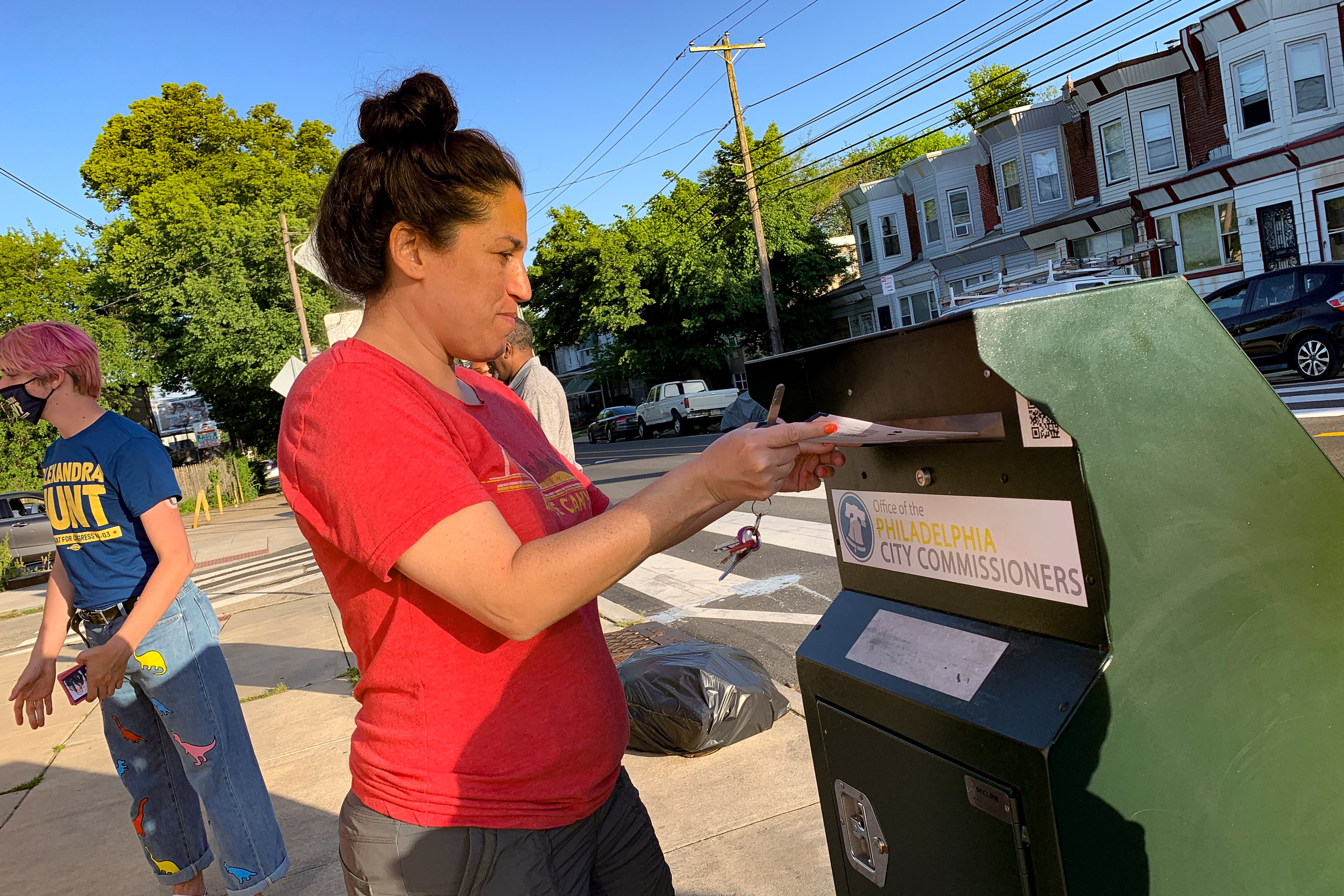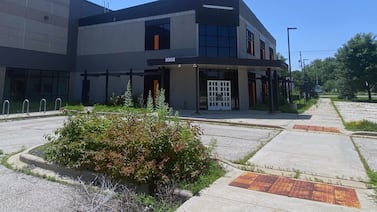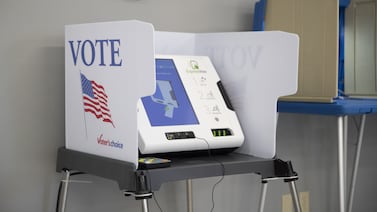Have you heard that the primary election is the only event when it comes to voting in Philly? Think again!
While the mayoral race may be all but locked up by Democratic nominee Cherelle Parker, there is still a competitive city council race and races for statewide judges where you can make your voice heard.
Votebeat has everything you need to know to make voting in Philly’s 2023 local elections go as smoothly as possible, and how to let us know if you run into any issues.
Who can vote
In Philadelphia, in order to participate in the Nov. 7 municipal election, you need to be a U.S. citizen and Philly resident for at least 30 days before Election Day. Philadelphians who live out-of-state, overseas, or who serve in the military can also vote, via mail-in, civilian, and overseas ballots. More on that below.
How to register to vote
Philadelphia residents must register to vote either in-person or online by Monday, Oct. 23. This deadline has now passed.
Residents are now automatically led through the registration process at a PennDOT photo license center when getting or updating their drivers license. Residents can also register in person at one of two county elections offices:
- 520 N Columbus Blvd., 5th Floor; enter through the Spring Garden Street entrance; 215-686-1590
- City Hall, 1400 JFK Blvd., Room 142; enter through the East or South portals; 215-686-3469
Registration forms are available in 16 languages: English, Spanish, Traditional Chinese, Simplified Chinese, Arabic, Bengali, French, Haitian Creole, Hindi, Japanese, Khmer, Korean, Portuguese, Russian, Tagalog, Vietnamese.
If you prefer filling out the voter registration form at home before submitting it to the County Elections Office, then paper applications are available at U.S. post offices, local public libraries, state liquor stores, other state government offices, and by phone at 215-686-1590.
Completed paper forms then need to be mailed or submitted in person to one of the elections offices listed above.
How to vote by mail in Philadelphia
All eligible Pennsylvania voters can request a mail-in or civilian absentee ballot.
The deadline is 5 p.m. on Tuesday, Oct. 31, and completed ballots must be received at the County Boards of Election by 8 p.m. on Nov. 7. Applications are available in English, Spanish, and Traditional Chinese.
Voters will need to prove their identity on the application, either by listing their driver’s license number or PennDOT ID number, or by providing a partial Social Security number and a signature — this can be a digital signature if applying online, or a physical one by printing out and mailing the application form.
For questions about absentee and mail-in ballot voting, call the Philadelphia County Board of Elections at 215-686-3469 or visit their office at City Hall.
If you are a voter who has an illness or physical disability that prevents you from filling in your own ballot, you can also apply to have someone help you. This person can be a family member or friend, but cannot be your employer, employer’s representative, union representative, or a judge of elections. Both you and your assistant must fill out an Assistance Declaration — you should submit it at the same time that you apply for a mail-in or absentee ballot, and the person helping you to vote must carry a copy with them if they are delivering your completed ballot in person.
How to make sure your mail ballot is counted
Now that you’ve filled out both the front and the back of each page of your mail ballot, what next? In Pennsylvania, it’s important to make sure you read and follow the instructions carefully so that your ballot does not get invalidated.
Here are the necessary steps to take, but if these differ from what you read on your ballot, follow the instructions that are typed on the ballot.
- Step 1: Seal the completed ballot in the inner secrecy envelope provided. It should say “official election ballot” on it. DO NOT write on the secrecy envelope.
- Step 2: Insert the inner secrecy envelope into the pre-addressed outer return envelope. It is OK to write on the outer envelope, which is where you must sign and date the “voter’s declaration” on the outside. Your signature and the written date of when you signed it are required for your ballot to be counted.
- Step 3: Seal the outer envelope. Add postage if you’re sending it through the mail.
- Step 4: Either mail the sealed envelope or hand-deliver it to the County Board of Elections, City Hall, Room 142. Or you can deliver it to one of the city’s official drop-off boxes. Mail ballot drop boxes are open until 8 p.m. on Election Day.
Completed ballots should be mailed at the post office several days before Election Day – in time for it to arrive at the County Boards of Elections by 8 p.m. on Tuesday, Nov. 7.
However, military service members and overseas absentee ballot voters get a grace period for returning their ballots. They have until the night before – 11:59 p.m. on Monday, Nov. 6 – to get their ballot postmarked and mailed in order to be counted. These ballots must be received at the County Boards of Elections by Tuesday, Nov. 14.
You can also vote early in person by applying for and filling out a mail-in or absentee ballot, all in one visit, at the City Hall elections office.
How to vote in-person on Election Day in Philadelphia
Polls are open from 7 a.m. to 8 p.m. in Philadelphia on Election Day, Tuesday, Nov. 7. You must be in line by 8 p.m. in order to be allowed to vote.
ID is required to vote only if you are a first-time voter in this county. If you have voted in Philadelphia before, no form of identification is required.
For first time voters, acceptable forms of ID include a valid voter registration card, state driver’s license or PennDOT ID card, U.S. passport, state-issued or U.S. government-issued ID, student ID, employee ID, non-photo ID issued by the state, current utility bill or bank statement, firearm permit, and other options listed here.
Find your polling place online by using the Pennsylvania Department of State’s Polling Place Search tool, or by calling the Philadelphia county voter registration office at 215-686-1590.
That phone number is also where you can confirm your voter registration status. Or log onto the state’s Voter Registration Status tool, where you can find your polling place, in addition to your registration status, voting districts, and political party, if any.
Watch this video to see how Philadelphia’s voting machines work.
When you arrive at your polling place, if for some reason your name is not listed in the book of registered voters, you will be asked to fill out a provisional ballot. It’s a paper ballot that will be counted if, when it is checked, you are confirmed as an eligible registered voter for that precinct. Provisional ballots are also used if you applied for, but did not return, a mail ballot or absentee ballot.
Firearms are allowed in some polling places, but not if the poll site is a weapons-free place such as a school or courthouse, according to Pennsylvania law. Campaign materials and flyers are only allowed if they are part of a voter’s clothing or if the voter keeps it with them throughout the voting process and does not engage in campaign activities.
“Ballot selfies” are allowed under the First Amendment, but must not include other voters and their ballots.
How to get assistance in voting
Voters with an illness or disability who require a mail-in or absentee ballot can fill out an Assistance Declaration form to designate a friend or family member as the person to help fill out and deliver the ballot to the county elections office.
For language access and translation services, more than 300 interpreters provide interpretation services at every polling place in the city. A “Language Line” phone service is available on-site for all voters if a bilingual interpreter is not available in-person for the required language. Voters select the language desired from a Language Identification Guide, and then a poll worker will call the Language Line to get an interpreter as needed.
Voters are also allowed to bring a family or friend to help as a designated agent, as long as they are not their employer, union representative, or elections office leader.
For wheelchair accessibility, some polling places are fully accessible (“FH”) while others are partially accessible. A list of fully accessible sites is available here.
How to learn about the candidates
We’ve collected a few comprehensive voter guides that go over candidate bios and issues ranging from education to the environment, gun violence to general knowledge. Several are Every Voice, Every Vote partners. Here are a few:
- The Philadelphia Inquirer’s voter guide on every race on the ballot
- Committee of 70’s guide to how Philly’s city government works
- Billy Penn’s guide on how the City Council election works and who’s running
- SpotlightPA’s complete guide to the candidates for Commonwealth and Superior Courts
- SpotlightPA’s interactive tool to illustrate why judges matter and how they shape policy
- Chalkbeat’s interview with Cherelle Parker on education issues
- Chalkbeat’s interview with David Oh on education issues
If you’d like to see the candidates in person, Billy Penn gathered a list of events being held in the city ahead of the election.
How to become a poll worker
Poll workers in Philadelphia open polling places, check in voters, and more on Election Day.
You can find more information about being a poll worker in the city and apply to become one here.
If you run into any problems, we want to hear about them!
Tell Votebeat what would make voting easier for you through our survey here.
If you have any other questions or concerns about voting in Philadelphia, please let us know! We can be reached at community@votebeat.org.
If you encounter or observe problems such as voter intimidation or possible voting rights violations at a polling place on Election Day, call the election hotline at 215-686-1590 or the Philadelphia District Attorney’s office at 215-686-9641 for assistance.
If an official mail-in ballot dropbox is full, not functioning, or is damaged in any way, call 215-686-3469 or email vote@phila.gov.
Heather J. Chin is a freelance journalist based in Philadelphia and Brooklyn who covers civic life, health, the arts, and Asian America. She has contributed to the Philadelphia Inquirer, NBC News, PBS, Village Voice, Edible Brooklyn, and other publications.
Carter Walker is a reporter for Votebeat in partnership with Spotlight PA. Contact Carter at cwalker@votebeat.org.

This article is a part of Every Voice, Every Vote, a collaborative project managed by The Lenfest Institute for Journalism. Lead support is provided by the William Penn Foundation with additional funding from The Lenfest Institute, Peter and Judy Leone, the John S. and James L. Knight Foundation, Harriet and Larry Weiss, and the Wyncote Foundation, among others. To learn more about the project and view a full list of supporters, visit everyvoice-everyvote.org. Editorial content is created independently of the project’s donors.






